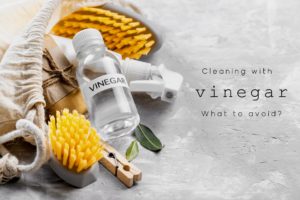
Vinegar is an eco-friendly, non-toxic and efficient product that can be used for a number of house cleaning tasks. If you have been interested in green cleaning, you probably know how many homemade product recipes include vinegar and the diversity of its many uses. It is perfect for disinfecting, dealing with mould and mildew, and cleaning various stains. However, vinegar is an ingredient that can damage a number of surfaces if not used correctly. What is more, when mixed with the wrong product or ingredient, it can cause a reaction that may be harmful to human health.
While vinegar is a great alternative to many descaling and cleaning products, there are certain places and surfaces where it should not be used. For example, it is not so good for dealing with deep-set grime and it can even etch and damage some surfaces.
Keep reading to find some of the items and areas that vinegar is not suitable for. By avoiding cleaning those with vinegar you will prevent damage and spare yourself time and effort.
1. Knives – If you have a set of nice knives that are grimy and need a good cleaning, do not use vinegar. The acid in the product can corrode the metal and dull the knife edge. For cleaning, use warm water and soap, and always make sure you dry them well before putting them away.
2. Marble – For your marble countertops, simply use a microfiber cloth, mild dish soap, and warm water. Vinegar will react with the stone surface and cause damage and defects to the countertop. Etching and dents will occur and your beautiful marble surface will be ruined. In general, you should avoid using harsh chemicals and products on your marble as well.
3. Granite – Same as marble, granite is a natural stone that will react badly with vinegar. When used on granite, vinegar will cause dullness and loss of shine over time. What is more, even though granite is a durable material, any acidic products and foods may cause the same bad reaction. Once etching occurs, you will have to sand and polish your granite surface in order to restore its original good looks.
4. Ceramic tiles – It is important that you clean your ceramic tiles on time. Remove grease and grime from your walls, floors, and backsplashes before they are set. When cleaning such surfaces, use hot water and mild dish soap, instead of vinegar. While most tiles will be able to sustain cleaning with vinegar, the product can eat into the grout and damage the finish of the tiles.
5. Egg spills – If you dropped an egg anywhere, do not rush to spray it with vinegar. That will make the egg thicken and harden. To get rid of the mess, try using salt. It will help you pick it up with ease.
6. Wood surfaces and furniture – Do not use any water-based cleaning solutions for soaking any type of wood furniture or items. What is more, manufacturers discourage the use of undiluted vinegar for this purpose as well. Vinegar may leave streaks and eat away some finishes. You can use a 1:1 solution of oil and vinegar to polish wood.
7. Phone and computer screens – Vinegar can ruin the protective layer on your phone screen. You should also not use it on computer screens. You can use a slightly damp microfiber cloth to wipe down screens and get rid of dust. Rubbing alcohol will help you get rid of germs and other microbes. It is best to always check the manufacturer’s instructions for more information on cleaning your screens.
8. Rubber – Whether you have any rubber items or you are trying to clean a rubber gasket or any hoses in your appliances, avoid vinegar. Its acid can eat away at rubber, similar to natural stone. A solution of soap and baking soda will do the trick.
9. Waxed hardwood flooring – You may have heard that vinegar is great for sanitising and de-griming wooden floors and surfaces. However, even when diluted, vinegar can damage your wax finish. When cleaning such items, choose a p[roduct that is specially labelled for waxed hardwood and avoid all-purpose cleaners.
10. Mirrors – While vinegar is amazing when it comes to cleaning glass and windows, it is not suitable for cleaning mirrors. Its acidic nature can seep behind the glass and corrode the metal that makes the mirror. Over time, you will notice that the reflective properties of your mirrors are not as good. It may also cause dark spots and streaks.
11. Unsealed grout – It might be tempting to use vinegar when cleaning your bathroom walls. It is a great product for getting rid of mould and mildew. However, it is not suitable for the job since it can permanently damage unsealed or cracked grout. Try using hydrogen peroxide or oxygen bleach instead.
